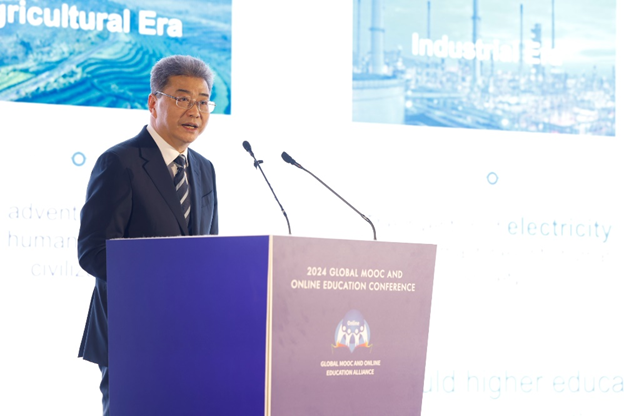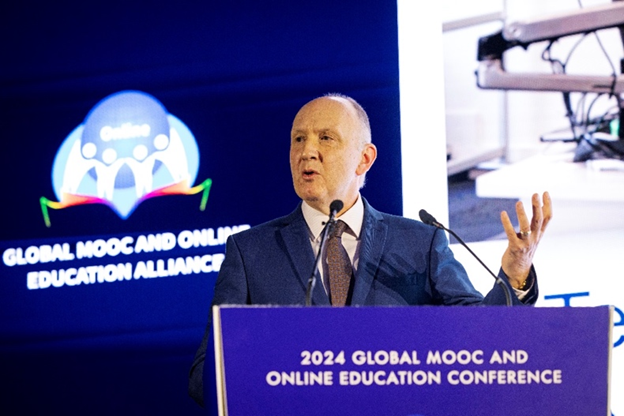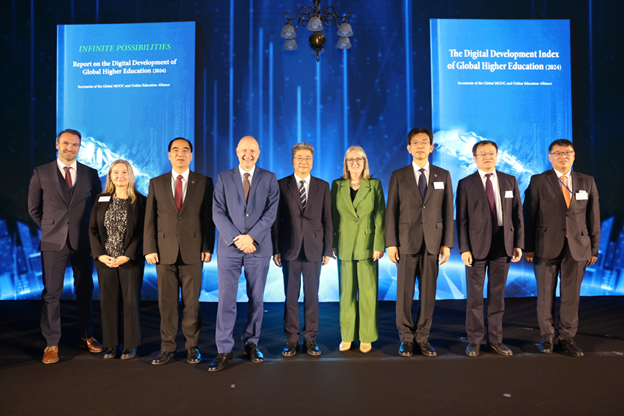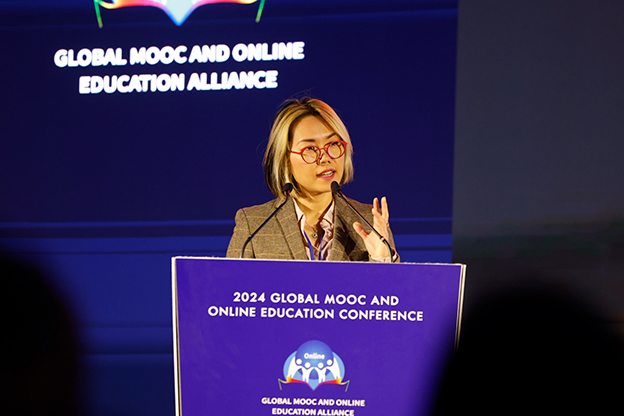On December 12 and 13, 2024, Queen Mary University of London proudly co-hosted the Global MOOC and Online Education Conference, themed "Reimagining the Future of Higher Education in the Intelligence Era," with Tsinghua University and Beijing University of Posts and Telecommunications at its Mile End campus. The Global MOOC and Online Education Alliance is a vibrant international community dedicated to the digitalization of higher education, currently comprising 16 universities and seven online education institutions from 16 countries across six continents. With more than 340 attendees and speakers representing 135 universities, online education platforms, international organizations, and government agencies across 32 countries and regions, the MOOC conference aimed to promote global cooperation, encourage innovative education methods, and foster the integration of digital technology to make high-quality resources more inclusive and equitable for all learners. The two-day event brought together educators, researchers, ed-tech businesses and global leaders to explore the transformative role of artificial intelligence (AI) in education.
Key highlights
Collaborate globally for the future of higher education in the intelligence era
The conference explored how AI is shaping the future of higher education. Speakers emphasized the need for collaboration between educators, researchers, and institutions to create more adaptable, inclusive, and student-centered learning systems. AI was highlighted as a tool to improve access to education, promote lifelong learning, and enhance teaching while keeping the human connection at the heart of learning.
Wu Yan, Vice Minister of Education for China, introduced the “3I” concept—Integrated, Intelligent, and International. He encouraged global universities to work together to build a smarter, more sustainable education eco-system for the intelligence era.
Empower students with the use of AI in education
The conference showcased some examples on how AI is transforming education. Among them is Dr Pedro Elston, Reader in Digital Education at the Institute of Health Sciences Education. He discussed collaborating with library services to develop a AI research skills module for the Faculty of Medicine and Dentistry, to help students develop their digital literacy skills and learn how to use AI effectively and ethically. He also shared his experience of using AI and digital tools, like augmented reality guides and co-created holograms, to address educational inequalities and support lifelong learning.
Assistant Professor Leonard Ng Wai Tat from Nanyang Technological University (NTU), 2024 Global MOOC and Online Education Alliance (GMA) Awardee, shared “Prof. Leodar,” an AI chatbot deployed as a study buddy. This innovative tool redefined teaching by integrating AI into classrooms and research, helping students navigate course content interactively.
Navigate the ethical dimensions of AI in education and practice
The ethical use of AI was a central theme, with panelists stressing the need for transparency, inclusivity, and accountability. Discussions explored issues like informed consent, ethical data use, bias prevention, and maintaining patient-centered care in fields like healthcare. Professor Amitha Ranauta from the Institute of Dentistry discussed the controversies surrounding AI in diagnosing patients, emphasizing the need to uphold fairness and respect for individuals. She highlighted how these principles translate into the education of AI, highlighting the importance of teaching future professionals to navigate ethical dilemmas responsibly.
Dr. Jo Elliott, Reader in Learning Design from FMD, expanded the discussion to include environmental impact. She emphasized the importance of considering AI’s ecological footprint, alongside supporting students in using AI responsibly. Jo advocated for fostering open dialogue, respecting cultural norms, and enabling context-specific decision-making when using AI.
The panelists collectively highlighted that ethical AI requires a holistic approach, balancing technological advancement with fairness, environmental impact, and human well-being. This involves ongoing collaboration, discussion, and diverse perspectives to ensure AI serves as a force for good.
Keep the human touch in the age of AI
As AI continues to revolutionize education, speakers at the conference stressed a vital point: humans must remain at the center of the learning experience. AI’s potential to design personalized learning pathways and create innovative, scenario-based models is remarkable, but human oversight is essential to ensure trust and ethical integrity. Educators play an irreplaceable role in fostering creativity, critical thinking, and lifelong learning—things no algorithm can replicate (yet!).
Stefania Giannini, UNESCO Assistant Director-General for Education, reminded us that while MOOCs and AI have expanded global access to education, human agency must always prevail. She described the conference as a “unique opportunity” to shape a future where technology supports learning without overshadowing the human connection that makes education truly transformative.
Watch highlights from the conference and hear insights from Queen Mary colleagues Professor Colin Bailey, Professor Chie Adachi and Professor David Leslie.
Exciting launch - Queen Mary Center for Excellence in AI in Education
Most excitingly, Queen Mary launched its Centre for Excellence in Artificial Intelligence in Education. Based within the Queen Mary Academy, the Centre is dedicated to embedding AI literacy in teaching and learning while providing staff with the tools to enhance educational practices. Professor Colin Bailey, President and Principal of Queen Mary, highlighted the Centre’s significance, stating that it reflects the university’s commitment to equipping students and educators with the AI-related skills essential for the future.
Led by Dr. Xue Zhou and Dr. Aisha Abuelmaatti, the Centre fosters collaboration between educators, researchers, and students to co-create a future-ready curriculum. By integrating AI and digital skills, it enhances student employability and upskills educators through shared expertise. The Centre also advances scholarship on the ethical use of AI, ensuring responsible innovation in education. You can find out more about this transformative collaboration in our interview with the Centre’s leaders.



